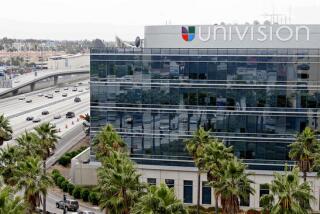Motorola Drops Satellite Project, Will Join Rival
- Share via
Motorola Inc. said Thursday it is dropping one of its own satellite communications projects and will instead invest $750 million in Teledesic, an ambitious rival program backed by Microsoft Chairman Bill Gates that promises to bring the world Internet access through the sky.
In making the switch, Schaumburg, Ill.-based Motorola will end work on its Celestri satellite network, a $12.9-billion project that was less than a year old and largely in the development stage.
Motorola’s investment--including an undisclosed amount of cash, plus the work already completed on Celestri--will make the company the prime contractor and the largest shareholder in privately held Teledesic, with 26% ownership. The company said it remains committed to Iridium, a separate, 67-satellite system that will offer mobile voice service worldwide.
Matra Marconi Space, Europe’s largest satellite maker, is also joining the Teledesic team under the expanded partnership announced Thursday. Matra Marconi had been working closely with Motorola on the Celestri project.
Other major Teledesic backers include cellular phone pioneer Craig McCaw, Saudi Arabia’s Prince Alwaleed Bin Talal Bin AbdulAziz Alsaud and Boeing Co.
By adding Motorola to the team, Teledesic both eliminates a potential competitor and gains funding.
It also essentially wipes out any hope that the massive project would bring additional satellite-building work to Boeing’s Seal Beach operation or to Hughes Space & Communications in El Segundo.
More than two dozen engineers from Boeing’s satellite-building operation in Seal Beach had been working on potential spacecraft designs for Teledesic, Boeing spokesman George Torres said.
“Now it’s a wait-and-see thing,” said Milt Furness, another Boeing spokesman. “They’ve added Matra and Motorola, both of which are established satellite makers. . . . We’re not sure if Seal Beach will or will not have any involvement.”
In El Segundo, Hughes knows its participation will now be limited at best.
Talks with Teledesic about providing satellites broke down over the amount of investment required, said Richard Dore, a Hughes spokesman.
“It really just turned out that we could not reach a satisfactory business arrangement,” Dore said. “It was a link that simply didn’t work out, but as [Teledesic] grows, if they need other help or assistance, we would certainly look at that.”
Teledesic, a partnership based in Kirkland, Wash., is building a 288-satellite project--expected to cost about $9 billion--that would connect computer networks and provide high-speed Internet access and videoconferencing worldwide.
But it’s an ambitious plan and just one of several expensive satellite projects aiming to tap into the growing need for telecommunications systems that span the globe.
“This is a good match,” said Phillip Redman, wireless services program manager at Boston-based Yankee Group. “But they’ve got some big challenges ahead--not only technologically, but also in marketing and in financing.”
In a conference call, the team members acknowledged that Teledesic must be sure its ground-breaking system is technologically sound, especially in light of this week’s pager outage, caused by a malfunctioning Galaxy 4 satellite.
“With the Galaxy failure, we all recognize that it’s hard to send the Maytag repairman to space,” McCaw said.
Motorola shares rose 56 cents to close at $55.31 on the New York Stock Exchange.
* BACK IN BUSINESS: PanAmSat restored satellite service to all of its customers. D3
More to Read
Inside the business of entertainment
The Wide Shot brings you news, analysis and insights on everything from streaming wars to production — and what it all means for the future.
You may occasionally receive promotional content from the Los Angeles Times.








